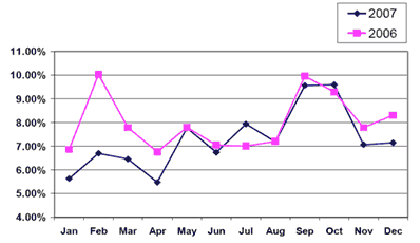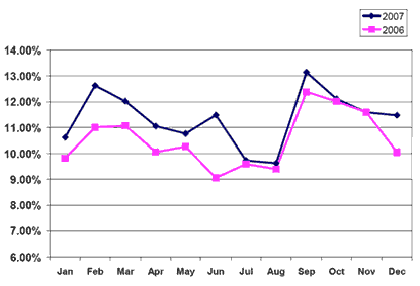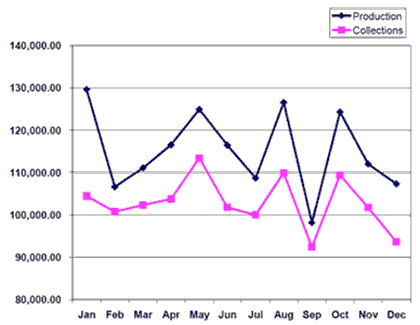Bulletin, April 2008
The Latest in Area Economic and Technical Trends
Exclusively to Clients and Friends of Advanced Practice Management
Worry Won’t Work!
Bad news about the economy abounds. Your lab guy and a couple of your dental buddies say things are super slow. Lots of gaps in the schedule. But the bills keep coming. Payroll has to be paid, the 401K funded, the new unit in room 2 paid for…
Many good mature practices experienced mild production declines in 2007. Other area trends:
Declining Collection Percentages: 91% is now the norm. It is not unusual to see dental offices collect even just 82% of their fees. Why? Increased PPO and M.A. write-offs.
Reduced Want Ad Counts: There were 1/10 the openings for hygienists as there were 6 years ago. Want Ad counts could be an indicator of economic slowdowns. However, the upside is better availability of qualified staff when you’re hiring.
More Downtime! After a good start in 2007, by fall, doctor downtime increased to 2006 levels. Hygiene downtime was higher all year.
Doctors’ Downtime as Percent of Hours Worked
2007 vs. 2006
January–December
There is a way out of the economic doldrums, a way to busy your schedules, more practice prosperity and a better bottom line. You’re not going to worry your way out and curling up into defensive inactivity will not make you safer. You’re going to manage your way out and up! With experienced management help you will know your staff is doing everything they can to fill the schedule. There is much they can do! Even the best staff is often unaware of simple key techniques that can make thousands of dollars of difference each month.
Hygienists’ Downtime as Percent of Hours Worked
2007 vs 2006
January – December
You don’t have to spend a lot of money. You and your staff don’t have to subject your patients to elaborate sales presentations or windy, canned scripts. Invest 1% to 2% of your time into practice management and you’ll experience a far greater return than anything you have in the Stock Market and infinitely greater return than worrying and commiserating.
Are PPO write-offs killing you?
If you’re collecting less than 88% you probably don’t have to take all the discounts you’re swallowing. The more PPO activity and discounts you have, the more likely it is that this is true. Sound illogical? Talk to me and I will tell you how we’ve added tens of thousands to our clients’ bottom lines (see below).
Overhead control:
Get a handle on your overhead so you can squeeze all the profit you are due out of every dollar you collect. And you collect every dollar you’re due! If you don’t have financial statements that give you a clear look at your bottom line, you should. We’ll help you get it done and show you how your expenses compare to Upper Midwest standards.
Stop Worrying – Take Action!
Trends:
Last Fall we completed our 12th Current Dental Practices and Procedures survey. Some highlights:
PPOs:
Generally Doctors join PPO’s with the hope of getting more new patients. Doctors stay for fear of losing patients. While there are many practices that do well with PPO participation and do have high volume I have seen several instances where participation in the PPO did not substantially increase new patient flow. We also have worked with offices that have left a PPO and maintained patient volume quite well. Check your write-offs. After staff salaries, your insurance discounts may be your biggest expense. You may well be able to greatly reduce writeoffs and add nicely to your bottom line.
Production and Collections 2007
Nine percent of survey respondents said they are planning on leaving a PPO in the coming months. If you are one of them, be sure you’re in touch with us. We can show you how to handle this so there is a minimal amount of disruption to you, your patients and even the insurance company.
- The majority of dentists surveyed charge at the crown prep (58%). 42% charge at the seating.We know that Delta and other insurance companies continue to ask that you charge at the seating but the majority of you disagree.
- Dentists are computerizing their treatment rooms. In our last survey, 30% of Doctors said they had terminals in all or most of their treatment rooms. It’s 43% now. Digital Radiography is up from 27% last year to 37% now. The Doctors with Digital Radiography give it good ratings (9 on a scale of 1-10).
- Although most Doctors are online at home, only 72% have Internet access in the office. Practices with websites have increased from 32% to 38%. Obviously if you have a Website and are encouraging patients to contact you via email you have to have connections in the office. Some Doctors hold off on connecting up the office because of fear of employee abuse of the Internet or getting a virus in their system.One solution is to simply have a stand alone computer online that is not networked with your practice management system.
- “Mechanized Endo” has leveled off at about 65% of practitioners. Adding Endo to the menu is one of the quickest ways for a GP to add to their services and revenues.
- 15% of the GP’s surveyed now offer Invisalign and give it pretty good ratings (7.9). Another great way to add to your services to patients. Don’t worry about your Orthodontists. They’ll still get plenty!
- 57% of the respondents are or have worked with a management consultant. I am proud to say that Advanced Practice Management serves more area dentists than all of the other firms combined and gets higher satisfaction ratings than all the top firms in our area.
- 17% of the respondents said that Cerec use is up a bit since last year but apparently growth here has leveled off a bit. Doctors with Cerecs give it a good rating of 8.5.
- Computer Software: SoftDent, EagleSoft, Dentrix and PEB (PEB for Windows and PEB XLDent) are the leading Dental software programs in the area. SoftDent users might feel a bit at sea since Kodak divested. Onyx has indicated that it’s going to recommit itself to supporting its clients but we haven’t seen a lot of evidence of that yet locally.Some of you know that Debra McGrath, one of SoftDent’s former top trainers in our area, is now working with us. So if you have SoftDent, she’s available for support. It’s still good software, but the staff has to know how to use it!
Don’t let your office manager retreat!
At a certain point when the Doctor’s practice is large enough (or Doctors are practicing in a group) there comes a time when they want a true office manager. They want someone to handle all the non-clinical aspects of the practice…especially staff hassles (scheduling vacation hours, interviewing, disciplining and generally calming the waters).
Yet, we see many office managers who have “retreated” (physically and figuratively to an area removed from the action). Perhaps they started at the front desk and were promoted to the office manager position. They get involved in the practice numbers (bookkeeping, payroll, insurance processing, credit follow up) and after a while are so busy managing numbers that they’re not managing people. Their front desk skills may have even gone dormant and they might be all but invisible to the treatment staff. Then, the staff hassles and other business matters end up back in the Doctor’s lap.
How does this happen? Often the Doctors are their own worst enemy in this regard. They set someone up to be an office manager but at the first unpopular decision (let’s say the manager did not grant your senior hygienist her preferred vacation time) the staff person does an end run around and goes to the Doctor directly. It’s at that point you determine whether or not your office manager is going to be a true office manager or a bookkeeper. Do you stand behind your office manager…knowing there will be some flack but knowing that they will be empowered to do what you want them to do, or do you back down and try to be a “Nice Guy/Gal” and end up with lots of management hassles you don’t want?
Often office managers do not take the cultivation of their supervisory skills as seriously as they do the numbers. They need to get to courses and read about leadership. They need to get out from behind the desk and walk around the office. This way they can listen to the staff’s problems and requests so they can grant resources as well as give direction. The office manager has to nail down Doctor decisions that need to be made and make sure those decisions are communicated throughout the office so that everyone feels they are in the loop.
Office managers focus on just getting through each day (like we all do). However a good office manager is future focused. Their job is not just to handle the day to day, it’s to help the practice reach its goals. Does your office manager know what your goals are? Do they have a strategy for reaching those goals? Are they reaching beyond the day to day duties each day to implement the gradual worthwhile changes that will help your practice excel? Are they actively looking for ways to cut your expenses? Are they totally familiar with computer software so you’re leveraging every application you can? Are they getting a reputation for making sure that decisions made at staff meetings are followed through and people responsible for the various systems are held accountable (and rewarded or not according to their performance)?
Would you like to take your office manager to the next level? We can help. Just call.
Making the most of hygiene downtime:
Your staff works hard to keep the hygienists’ time filled. Yet, it is common for hygienists to have 10% of their available time open. Since downtime is inevitable, it is important that there is a plan to put their time to good use even when patients don’t show.
Suggested hygienist’s priorities during downtime
- If you know your next hour is open, take more time with the patient you are with. Perhaps do a shade guide. Take more time to listen to the patient. Check if an FMX or Pano is due.
- Ask if you can help the Doctor or assistant. Perhaps do anesthesia for the Doctor’s patient. Help set up or break down a room. Not only does this help move the Doctor’s day along, it builds good team feelings when you help across the hallway.
- Ask if another hygienist needs help. Perhaps mounting a fullmouth x-ray or perio charting. Maybe that hygienist has a full schedule and you could do an impression for a bleaching tray for her patient (and save the patient a trip).
- Help the front desk staff. Help in recall, confirming or pre-confirming your schedule. Also call patients that decline or miss perio treatment.
- If you have checked with the assistant, hygienist and front desk staff, then restock your room, sharpen instruments, etc.
- There should always be something constructive for you to do. If you are not working, we ask that you check out. Adapt this list to suit your office and post in staff lounge or sterilization area.
Front desk person no longer barrier to treatment:
It happens everyday. Well-meaning front desk people in an effort to “enforce your financial policy” end up inadvertently scarring off patients or failing to schedule treatment you recommended.
Even the best and most experienced front desk people may not know how to approach people regarding money and their payment options. With the right approach patients are more likely to get the treatment done now and you are assured that you’ll get paid for your work.
The correct management of credit is a matter of semantics, philosophy, and simply good staff training so your staff knows what works and what doesn’t work. Just call and we’ll make it happen.







